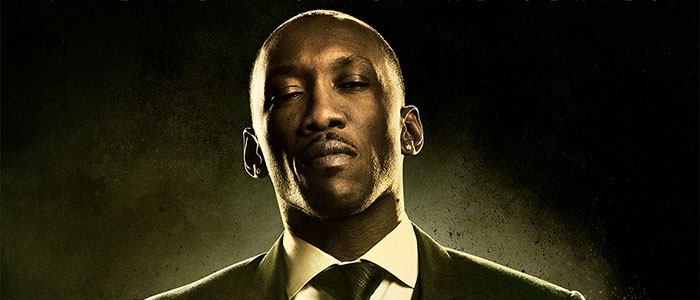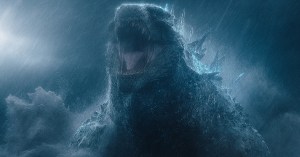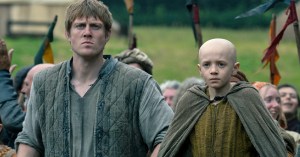13 Things to Know Before You Binge Marvel’s Luke Cage
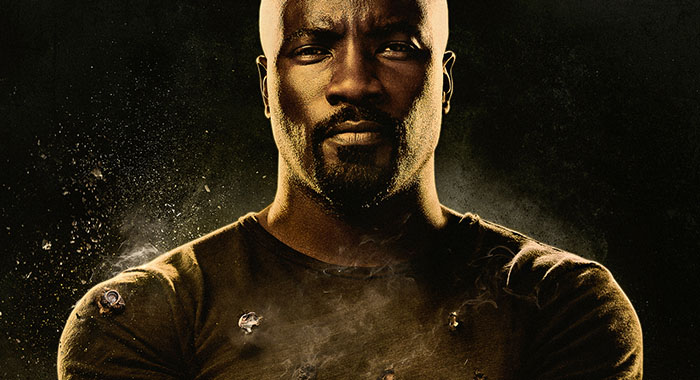
Usually when a TV character gets his or her own spin-off, it’s after years on another show — like Frasier or Joey. Marvel strongman Luke Cage got his own show after only one season on Netflix hit series Jessica Jones, but Cage already had his own comic books that intermingled with Jessica’s. The plan was always to give him his own series.
Marvel’s Luke Cage premieres September 30 on Netflix with all 13 episodes available to binge-watch. We spoke with showrunner Cheo Hodari Coker and stars Mike Colter, Simone Missick, Alfre Woodard, Mahershala Ali, and Theo Rossi before their panel for the Television Critics Association this summer. Here are 13 things we learned about Luke Cage from them.
1. The Language Is Harsh, But Real
Comic books have specific imprints for mature content, and they can technically say anything they want on Netflix, but so far the Marvel Cinematic Universe is firmly in PG-13 territory. It might be shocking, for instance, to hear the N-word in a Marvel show. The gangster kingpin Cornell “Cottonmouth” Stokes (Ali) says it in the comfort of his nightclub Harlem’s Paradise, and Coker had good reasons for putting that word in his mouth.
“Well, it was a conversation, but I said, ‘Look, I’m doing it,’” Coker said. “Not from the standpoint of wanting to get anybody in trouble or say anything like that. It’s just I felt that to not use these words within these situations softened it. So for example, when Cottonmouth uses that word in Harlem’s Paradise, Mariah immediately reacts to it. She doesn’t like the use of that word. But then somebody else in his criminal organization also uses the word later on. I want people to artistically struggle with it. I want people to acknowledge the fact that the word exists.”
2. Luke Is Different, But Recognizable
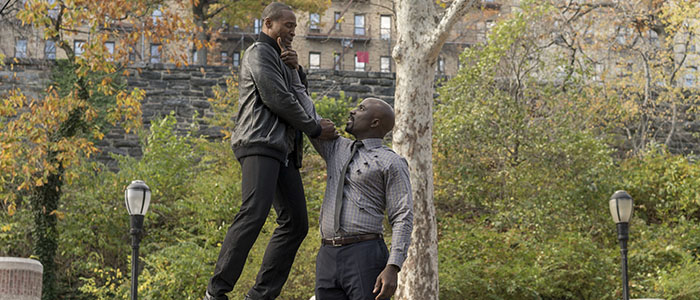
We already got to meet Colter as Cage on Jessica Jones. But if you think you already know Cage, you’ve really only seen one side of him, and it was through Jessica’s perspective. Colter related how he changed since he grew up in small town Columbia, South Carolina, and how that parallels Cage’s changes when he moves to Harlem.
“There’s a certain way that people talk where I’m from,” Colter said. “When I moved away 20 years ago, went off to college and went on to grad school, I had no qualms about trying to lose all that. Didn’t care, didn’t want to hold onto it, because I didn’t see that serving me moving forward. I wanted to find a different person. I wanted to develop myself in a different way. So yeah, when I go home, sometimes I feel the need to speak a different way to some people, because it helps them connect with me. At times I don’t bother.
“There are times when I see my college friends. Again, that was a different me too,” he continued. “College was different. I have different friends, and sometimes I’m different around different people. Sometimes you have different humor with different people. So I think Luke Cage in this story — we talked about him going to Harlem. It’s like he’s the same guy he was in Jessica. He’s just around different people.”
3. Misty Must Eventually Accept Luke’s Help
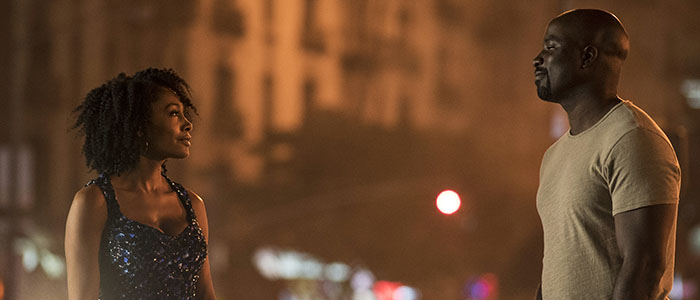
Simone Missick plays Misty Knight, a Harlem detective who wants to do things by the book. Even though Luke Cage is indestructible and has super strength, she doesn’t want him butting into police business. At least this is how she feels when she thinks she’s dealing with a routine homicide case. Eventually she’ll realize she has to team up with a superhero.
“I think the thing with Misty is that she is so focused on doing things the right way,” Missick said. “She became a detective in order to help her community. She went back home essentially in order to be part of the solution. For so long, as these episodes progress, it’s difficult for her to know if Luke is a part of the problem or if he’s a part of the solution. He’s very secretive about his abilities, his intentions. He doesn’t really want to help her because he doesn’t really want to be involved. So it creates this clash between the two of them which is essentially the crux of their relationship for so much of the season. It does get pretty bad before she eventually has to say, ‘OK, I cannot do this by myself.’”
4. Alfre Woodard Accepted a Demotion
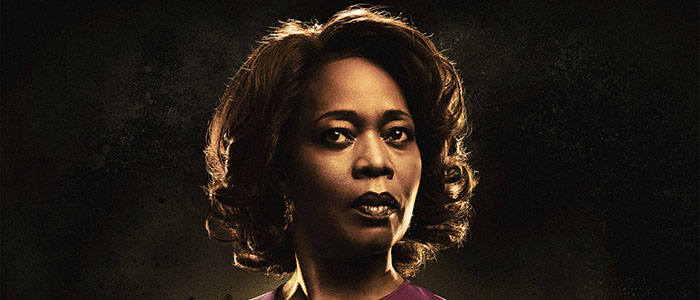
Woodard plays Harlem councilwoman Mariah Dillard. Last year, Woodard got to play the president of the United States on NBC’s State of Affairs. Even though she was not actually elected to either office, Woodard joked that she took it personally, at least until Coker told her what was in store for Dillard.
“Cheo just liked me,” Woodard said. “He just wanted me to be in it, but I was thinking, City councilwoman? I was the president for the last year. But then he said, ‘The city councilwoman of Harlem.’ I know how much he loves Harlem, the history. He grew up knowing the culture and the history and the importance of Harlem so you can smell and taste and hear. If you haven’t been, you’re going to want to go to Harlem and find that Harlem after you see this thing. So Harlem did it.”
Fans of the comics might already know what Dillard becomes, but we won’t spoil it for people discovering her for the first time. Let’s just say — get ready for episode seven!
“I was like, ‘Oh God, I gotta be nice,’” Woodard lamented. “He goes, ‘No you don’t. She’s very complex.’ So when he said ‘complex,’ I was fine. Then after I was already in, he goes, ‘You’ve got this relationship with your cousin and all this. Then this is going to happen.’”
5. Cottonmouth Is Bad for Good Reasons
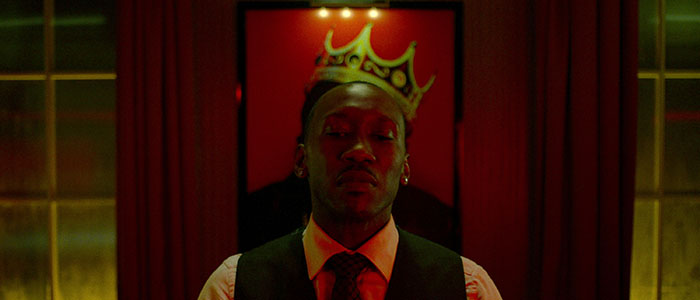
While Mariah is on the Machiavellian political path, her cousin Cornell is running the criminal underbelly of Harlem from out of the nightclub Harlem’s Paradise. They face off about who has the better path to changing things in Harlem, but even Cornell sees himself as a champion of the greater good.
“His bad is good bad,” Ali said. “So there’s some range and a lot of play in there, but it all is grounded in him thinking and believing that he is doing the right thing. He is doing what is necessary to keep order. Keeping order is really important because that is connected to his survival, survival of the family. Survival of the legacy of the family and what that means, that sense of pride, that sense of ownership that is fairly unique in Harlem.
“Harlem is a mecca for black culture,” the actor continued. “So to have a stake in that, to have a place that is a symbol of success, in carrying along the family name, running the family business — there’s a lot that is wrapped up in him feeling the pressure that he feels to keep the order, to grow the business. [You’ll see] how that relates to the pressure that Mariah puts on him along with the vision that she has to legitimize the business in a way that will give it a different degree of sustainability.”
6. Shades Is Playing Game of Thrones in Harlem
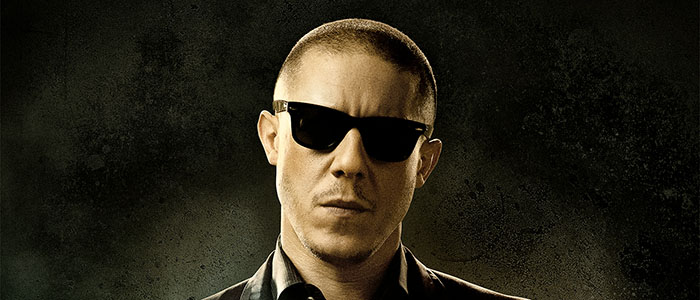
Then there’s Shades Alvarez, played by Theo Rossi. Between Cottonmouth and Mariah, you might not think there’s room for any other villain, but Shades has strategy. It took Petyr Baelish (Aidan Gillen) seven seasons to get where he is on Game of Thrones, and Shades has that kind of time.
“Cheo said Shades is the Littlefinger, for our Game of Thrones fans, of the world,” Rossi said. “Yes, observing to see what’s going on, you’ve just go to keep watching. That’s a good way to look at it. And there’s a reason behind everything. That’s the truth. Some of the greatest, most powerful people don’t even have to do things on their own. They watch people do it to themselves, and they advance from it. He’s an extremely cerebral character, like nothing I’ve ever played. I think that’s what’s so interesting. He is, for lack of a better word, he’s extremely shady. He’s very shady.”
7. Luke Cage Can Still Be Killed
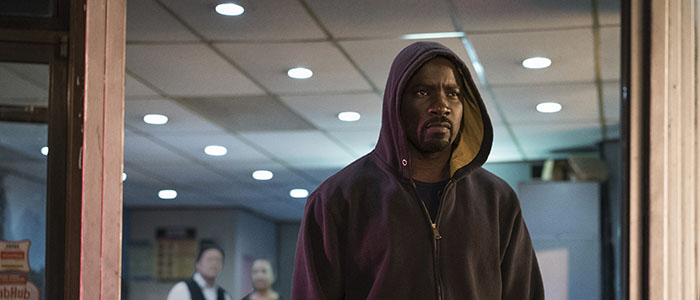
So Luke Cage is bulletproof. It might get old if bad guys are shooting at him every week and going, “Whaaaa?” when he doesn’t fall down. Good thing Luke Cage has some smart villains who devise other nefarious ways to do him in.
“When you get to episode six, Mariah has various scenarios,” Coker said. “When you begin to see the darker shadings of Mariah, she has various scenarios involving suffocation, about how do you possibly get out of it.”
8. Only Harlem Is Big Enough for Luke Cage — Literally
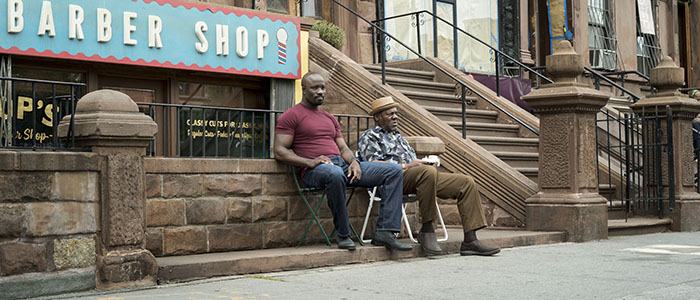
Luke Cage films on location in Harlem. It’s the perfect setting for a number of reasons: There’s the authentic atmosphere and celebrating the history of the community. There’s also a practical advantage to Harlem; as Colter points out, it literally has bigger sidewalks.
“Technically speaking, Harlem’s sidewalks and boulevards are so large, it’s the perfect place to shoot,” Colter said. “You want those great hero shots coming down the street. You want your hero to have room to walk. You go on Manhattan streets, there’s not much room to walk. Luke Cage coming down the street is like, ‘Excuse me, excuse me.’ No, he has his own path. Walk down and ‘Get out of the way, get out of the way.’”
9. Luke Cage’s Showrunner Wants You to Read More
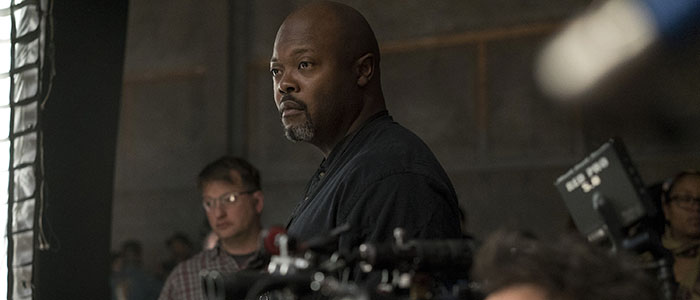
Watching Luke Cage may obviously make fans go back and read the decades of Luke Cage comic books, but Coker is taking it further: He’s including numerous references to authors Ralph Ellison, George Pelecanos, Richard Price, Donald Goines, and Walter Mosley. Once you’ve watched all 13 episodes, maybe you’ll run out to the library.
“The good and bad news about binge-watching is that once you get to 13, that’s it,” Coker said. “So if people love the series, and they start watching it again, and then they get bored watching it over and over again, they’re going to say, ‘Wait a minute, what are these books that they keep talking about? It’s going to be a year before Luke Cage season 2 comes out. Why don’t I try to read some of this stuff?’ That’s how it starts because as a reader, I started reading at an early age, and I fell in love with the written word. I was an English major at Stanford.”
10. And Listen to More Music
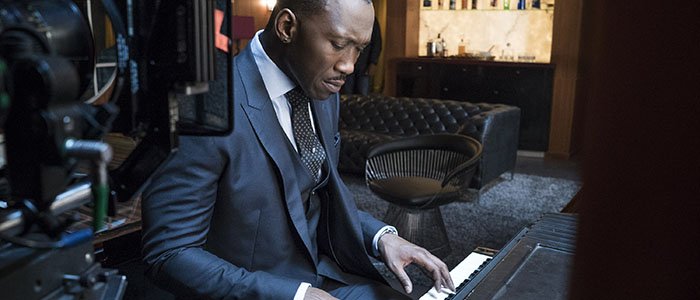
Since Cottonmouth runs a nightclub, Luke Cage can feature actual musical acts on the show. Aritsts like Raphael Saadiq, Faith Evans, and Charles Bradley will appear in Harlem’s Paradise. Other artists will appear on the soundtrack and Coker hopes fans will listen to them further.
“People that are fans of hip-hop will love the music, but people who aren’t fans of hip-hop will also love the music because it isn’t just Wu-Tang,” Coker said. “It’s also Mahalia Jackson. It’s also Nina Simone. It’s also Donald Byrd. It’s also John Lee Hooker — the entire spectrum of black music. Adrian Younge and Ali Shaheed Muhammad also recorded the score with a 30-piece orchestra. So there are just so many different things. It’s lush. I just can’t wait for people to see it, hear it, experience it. I’ve always been a geek. This is the opportunity to meld my geekdom, my love of literature, music all in one place.”
11. Speaking of Music, the Defenders Are the Beatles
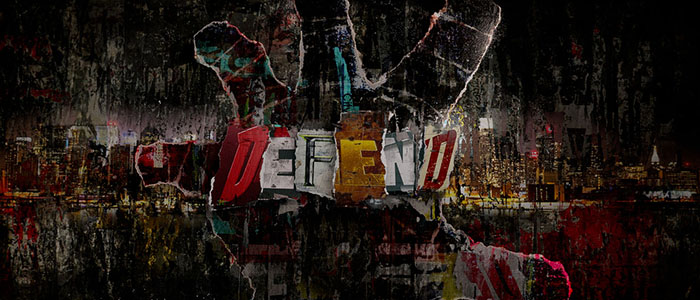
Luke Cage is 1/4 of Marvel’s plan to create another superhero team-up, The Defenders. The other Defenders are Daredevil and Jessica Jones, who’ve already had their own shows, and Iron Fist whose show premieres after Luke Cage. Coker describes the Defenders as the Beatles. So which is Luke Cage: Paul or George? And who’s Ringo?
“That’s kind of what I meant by ‘Beatles in reverse,’” Coker said. “For example, Wings sounds different than the Beatles. John Lennon’s solo records sound different than the Beatles. But when he and Paul come together, all of a sudden it’s a Beatles record. That’s the thing about this show: They’ve allowed us as creators to each have our own rhythm. Each show can represent a different Beatle, and they all have done solo records. George Harrison’s records also sound very different. But then when they come together, then it has a certain feel, and so that’s the thing: Each series gets to be its own thing, but then when they come together for The Defenders, for the supergroup, it’s the reverse.”
12. Mike Colter Almost Said No
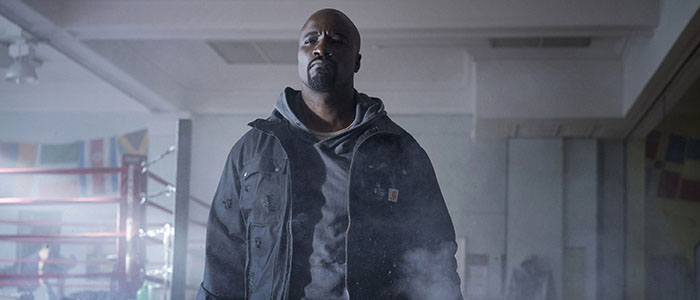
Luke Cage is the role of a lifetime, according to Colter — even to play him on Jessica Jones, let alone to get his own show. So it might surprise fans that Colter wasn’t sure he wanted the job. The timing came when he was hoping to spend more time with his family, but ultimately the team behind Luke Cage was too good to pass up.
“I was expecting a child,” Colter said. “It was just the timing and location. It just was a curveball. It’s a great problem to have. These are high-class problems. Ultimately, I felt like this is one of those opportunities with just writing and everything. If I didn’t see the first episodes of Jessica, if I hadn’t seen the scripts, if I hadn’t seen what I thought their vision would be, and I hadn’t seen Daredevil, it would’ve been a much harder sell. But I saw that there was some good people involved here, and I couldn’t ignore that.
“At the end of the day,” the star said, “you want the best project, and you want the best writing. You want to be working with the best people. So you can’t just say, ‘I’m not going to do it’ because of these what ifs. I can’t live my life that way. So I had to go with my gut instincts, and it was very hard to ignore that this was a great role. I wanted to have a chance to play it.”
13. There’s More in Store for Misty Knight
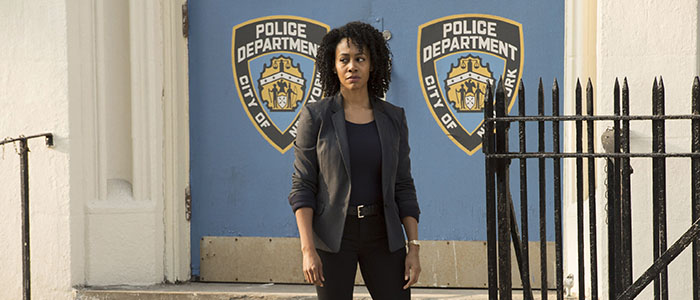
Misty Knight is another character with a rich comic book history. In another possible spoiler, she doesn’t remain a detective forever in the Marvel comics. Whether or not she gets there in season 1 remains to be seen, but Missick is ready for everything Misty might become.
“I think about it because I’ve got so many people around me who are like, ‘Are you going to be in Daughters of Dragon? Do you have the arm? Are you going to be an action figure? Will there be an amusement park ride based off you?’” Missick said. “The people that come to me, they’ve got all these wild dreams, and I’m like, ‘Yes!’ I’m doing a Shonda Rhimes: I’m like, ‘Say yes to everything. This is the year of the yes.’
“So it is really exciting,” she said, “because there are so many different ways that they could take this character. You see they’ve got Colleen Wing now [in Iron Fist] and you know what historically that is for Misty. It could go a million ways. I just know they’re not killing me off season 1. Spoiler! Misty doesn’t die yet.”

